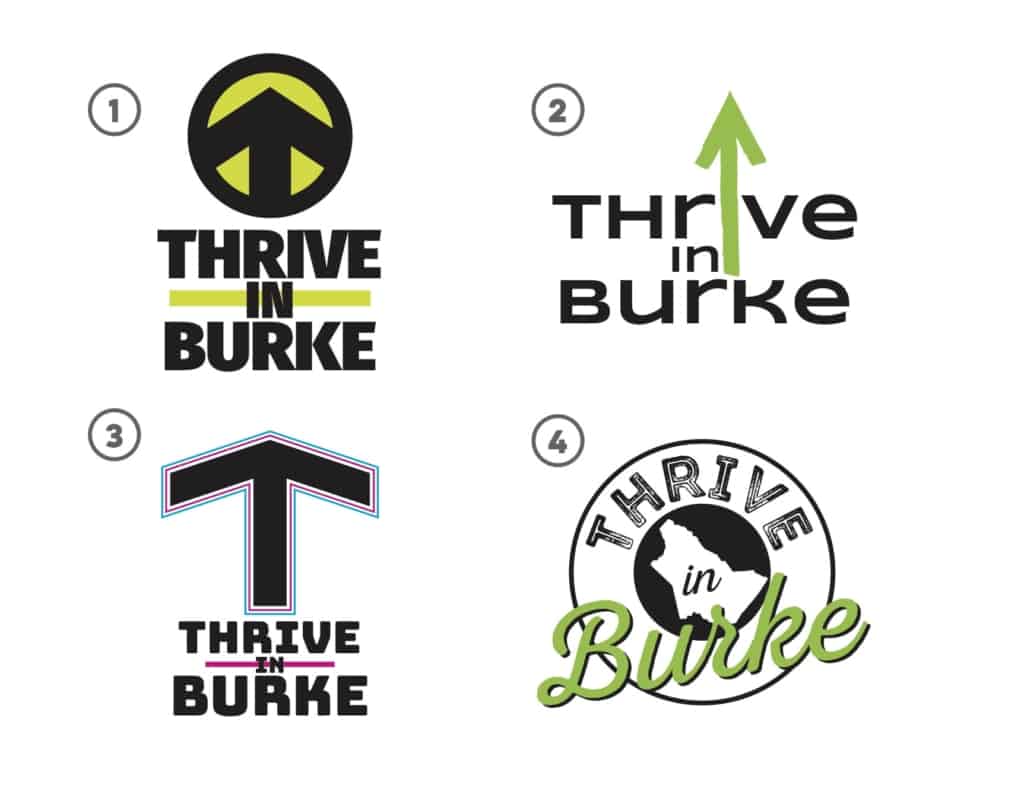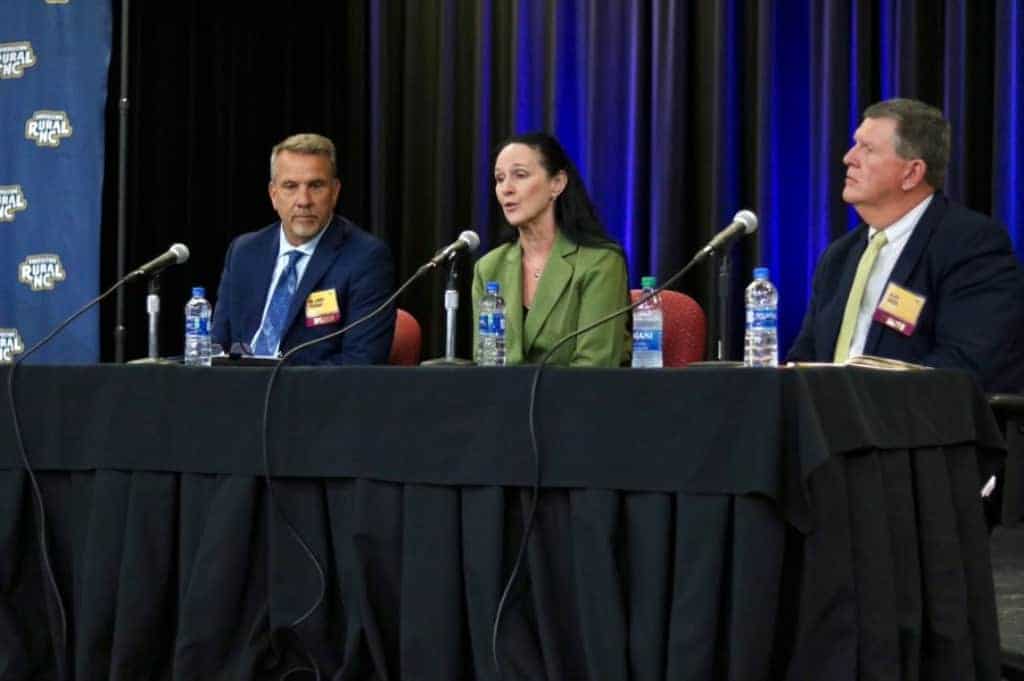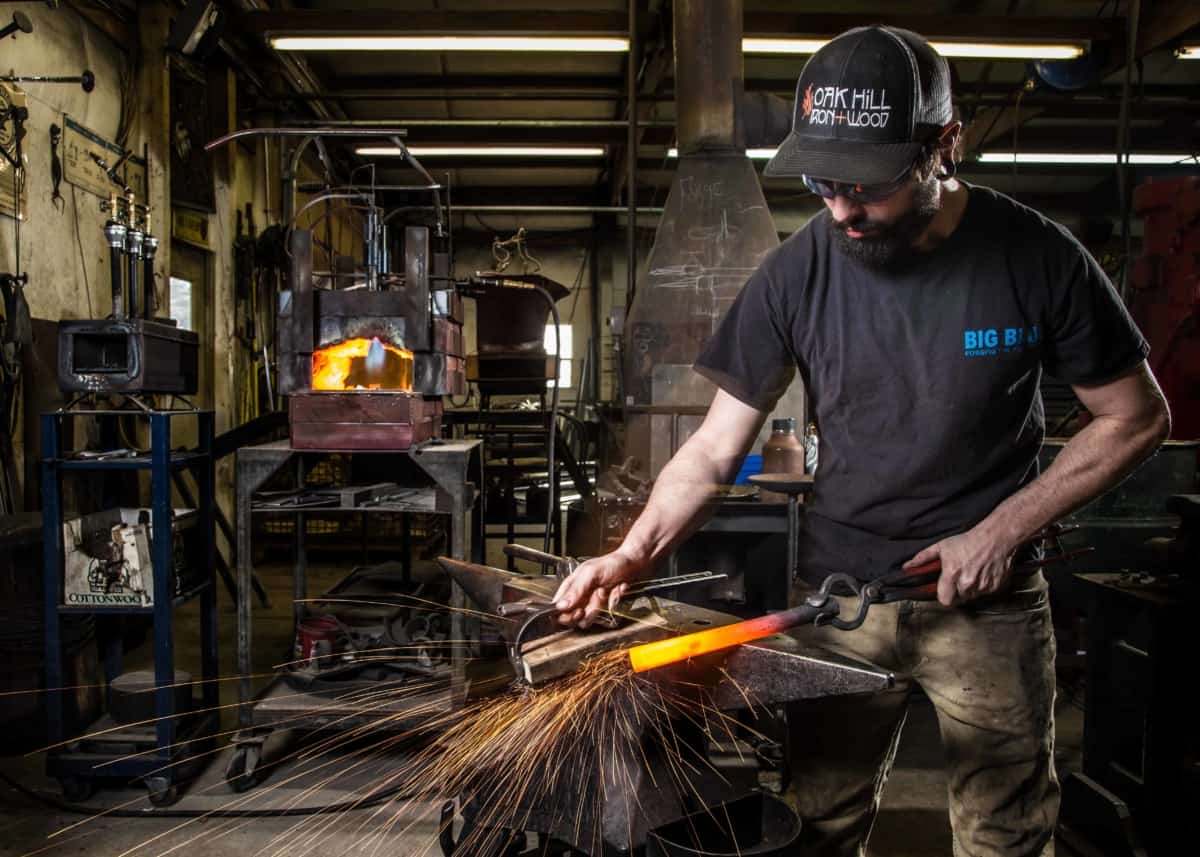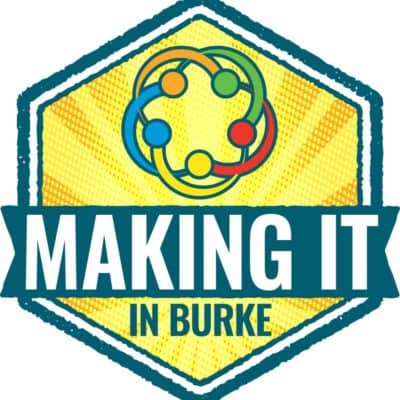The Energizing Rural NC conference this week focused on one point over and over again: rural counties struggle to recruit and retain an adequate workforce. Jobs are available but they go unfilled, which hurts rural manufacturing and industry. As a result, less productive industry diminishes the tax base and economic well-being of the county as a whole.
Take Burke, a county straddling the edge of the western piedmont and the mountain region, with its county seat, Morganton, right on I-40. Manufacturing is, and has long been, the economic driver in the county. Less than a generation ago, the industry made up 50% of the jobs in the county, according to Alan Wood, president and CEO of the nonprofit Burke Development Incorporated (BDI). Today, manufacturing makes up about a third of the jobs. Health care and social assistance is the next-largest field and is expected to grow significantly.
Even while manufacturing is shrinking, more jobs require advanced training. The health care industry has also changed — most jobs now require some level of higher education.
“The amount of mechanization and robotics that are coming, jobs are going to require more and more skills,” Wood said. “If you don’t have those skills, you’re going to have more and more people that are going to be working or trying to get less and less good-paying jobs. That’s going to be a disaster.”
Preparing the future rural workforce
BDI knows what the future holds, and it launched the Work In Burke project to prepare for it. The county has jobs that are going unfilled and jobs that are requiring more education and training. Currently, less than half of high school graduates in Burke County pursue higher education of any kind, Wood said.
Work In Burke is a marketing campaign aimed at increasing students’ interest in jobs in Burke County and works to show them what that will take.
“What really led to [Work In Burke] is looking at the numbers,” Wood said. “In the number of students continuing their education versus the amount of jobs that require education beyond high school, there’s a mismatch. When you have 50% of your students, only 50% or less, continuing their education, and 65% or 70% of jobs require advanced skills, you just can’t continue that track without changing something. It’s just not sustainable.”
The strategy brings together industry partners, Burke County Public Schools, and, crucially, the local community college, Western Piedmont (WPCC).
Measuring success
When it launched in November 2017, Work in Burke had two long-term goals that it hoped to reach in five to 10 years. First, they wanted to see a 15% decrease in negative perceptions of local job opportunities. Second, they wanted a 15-to-20% increase in Burke County Public School graduates that pursue postsecondary education. That means they want 70% of their graduates in community college or getting four-year degrees.
To measure success, Work In Burke surveyed all public high school students in the fall of 2017 on their perceptions of manufacturing jobs and now conducts annual surveys to track changes in perceptions.
After one year, the survey saw a slight moving of the needle — between 3 and 6 percentage point increases — in response to questions about whether manufacturing jobs offer good pay and benefits, whether manufacturing is a good industry to work in, and if students think there are jobs available in the industry. The 2019 survey will be conducted next month.
Sara Chester, who was the Work In Burke director until July and still oversees the program, has spent a lot of time in the county’s schools talking to students about manufacturing. At the urging of Larry Putnam, superintendent of Burke County Public Schools, Work In Burke collaborated with students to create the marketing campaign.
Chester gives presentations in schools about manufacturing jobs, talking about how they are different today from the hard-labor, dirty, hot manufacturing plants of their parents’ and grandparents’ generation. Still, she sometimes receives push back. Chester told a story on stage at the Energizing Rural NC conference about a little boy interrupting her classroom presentation on how great manufacturing jobs are. Both his parents had those jobs, the boy said, and they “hate it.”

Retaining the workforce
That leads to Work In Burke’s next challenge. If young people enter the local workforce, they have to like the jobs they get. Otherwise, they won’t stay.
“That’s why we have started sort of a second tier of this by having companies looking at their employment and how they hire and retain employees,” Wood said. “Because it’s important for us that they, the manufacturers, are adapting to a different labor force, too.”
Work In Burke started the “Next Gen Worker Committee” to build buy-in and trust between millennial workers and management, and to hear about what younger workers want out of their jobs.
The Meridian Specialty Yarn Group has been a leading industry partner for Work In Burke, and their human resources manager Debbie Sigmon led the first worker committee. Though she can’t compare apples-to-apples, Sigmon estimates that the program has led to a 20% decrease in turnover. That’s crucial, as it’s easier to hire workers than to retain them, Sigmon said.
Through the committee, Sigmon learned that millennials have different expectations out of their jobs than the previous generations. They want more time outside work, want more of a personal life, and don’t want to be in the plant for 60 to 70 hours a week, Sigmon said during the Work In Burke panel at the Energizing Rural NC conference.
“I think it’s important for employees to feel like they understand what their path forward to success is, and what is expected of them from management, and if there are opportunities for the employees to have input on work processes that make their lives more enjoyable, or make their work easier or more constructive,” Wood said of the working groups.

Community college enrollment
Work In Burke is also tracking rates of enrollment in postsecondary institutions, with particular attention on Western Piedmont Community College’s trade programs.
“We have doubled enrollment in some of our programs, mechatronics being one, as a result of renewed interest by our stakeholders,” WPCC’s President, Michael Helmick, said in an emailed statement.
This fall, WPCC saw a 9% increase in curriculum program enrollment, the “first significant enrollment increase in the last nine years,” which Helmick credits to the colleges’ collaboration with Work in Burke.
Putnam, the superintendent for the county schools, started a calling campaign to every student who graduated from their district but did not enroll in college — and to their parents. His goal is to find out what they are doing now and to direct them toward opportunities at the community college.
Work In Burke started by reaching out to kids while they were in school. Now, they are targeting parents — inviting them along with their kids to WPCC enrollment events — and hosting luncheons at factories to talk to workers about getting their kids engaged in continuing education.
“Having all those partners on board and pretty much telling the same tale, singing from the same hymnbook, if you will, is critical for a long-term process … ” Wood said. “It is not a quick fix. I wish there were a quick fix, but we’re dealing with a system that has been years in the making, so it’s going to take time, five to 10 years, for us to get the numbers where we want them to be.”







